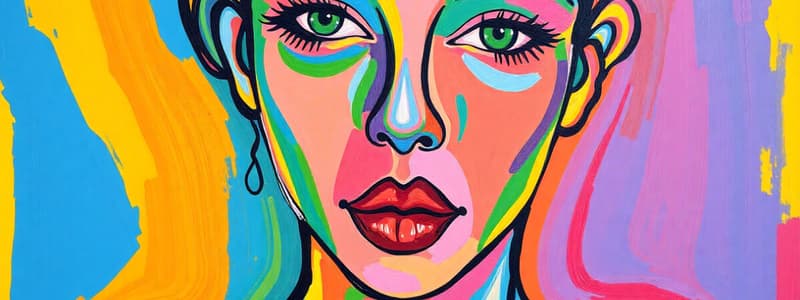Podcast
Questions and Answers
What is a primary factor contributing to one’s physical self?
What is a primary factor contributing to one’s physical self?
- Cultural beliefs
- Education level
- Social interactions
- Physical features (correct)
What aspect of self-image can lead to feelings of unattractiveness?
What aspect of self-image can lead to feelings of unattractiveness?
- Meeting beauty standards
- Having a supportive group of friends
- Believing that beauty is tied to specific body types (correct)
- Engaging in regular exercise
How does society influence body image?
How does society influence body image?
- By enforcing a strict set of beauty standards
- By promoting healthy eating habits only
- By isolating individuals from various social interactions
- By shaping perceptions through media and interactions (correct)
What is one way the media reinforces cultural beliefs about appearance?
What is one way the media reinforces cultural beliefs about appearance?
What do personal and societal perceptions of body image contribute to?
What do personal and societal perceptions of body image contribute to?
Which of the following is NOT a component of body image?
Which of the following is NOT a component of body image?
What increase in body control behaviors is associated with negative body image?
What increase in body control behaviors is associated with negative body image?
What might trigger the biological processes that contribute to physical features?
What might trigger the biological processes that contribute to physical features?
How might one enhance their perception of beauty?
How might one enhance their perception of beauty?
Which of the following is NOT a consequence of negative body image?
Which of the following is NOT a consequence of negative body image?
How does society impact individual body perceptions?
How does society impact individual body perceptions?
What is one effect of media representations of body ideals?
What is one effect of media representations of body ideals?
Which factor contributes to prejudice regarding body size and shape?
Which factor contributes to prejudice regarding body size and shape?
What do family and friends influence regarding body image?
What do family and friends influence regarding body image?
Which of the following does NOT describe the role of media in body image?
Which of the following does NOT describe the role of media in body image?
What is an implied risk of comparing oneself to media standards?
What is an implied risk of comparing oneself to media standards?
Flashcards
Physical Self
Physical Self
The way we perceive and experience our physical bodies, including our appearance, biological characteristics, and how we feel about our bodies.
Biological Blueprint
Biological Blueprint
The genetic and biological factors that determine our physical characteristics, such as height, weight, facial features, and body structure.
Body Image
Body Image
The mental picture we have of our own bodies, including our perception of size, shape, and attractiveness.
Self-Image Problem
Self-Image Problem
Signup and view all the flashcards
Society's Influence on Body Image
Society's Influence on Body Image
Signup and view all the flashcards
Internal Perception
Internal Perception
Signup and view all the flashcards
External Perception
External Perception
Signup and view all the flashcards
Cycle of Discontent
Cycle of Discontent
Signup and view all the flashcards
Body Image Dissatisfaction
Body Image Dissatisfaction
Signup and view all the flashcards
Extreme Body Control Behaviors
Extreme Body Control Behaviors
Signup and view all the flashcards
Unattainable Body Ideals
Unattainable Body Ideals
Signup and view all the flashcards
Size Prejudice
Size Prejudice
Signup and view all the flashcards
Media's Role in Body Image
Media's Role in Body Image
Signup and view all the flashcards
Cultural Influence on Body Image
Cultural Influence on Body Image
Signup and view all the flashcards
Family and Friends' Impact
Family and Friends' Impact
Signup and view all the flashcards
Importance of Being Realistic
Importance of Being Realistic
Signup and view all the flashcards
Study Notes
The Physical Self
- A crucial aspect of the self is a person's physical features, including face, body structure, height, and weight.
- People should also consider their physical abilities, perceived worth, and perception of beauty.
- Frequent questions are: Am I beautiful? Do people find me attractive? What can I do to enhance my features?
The Biological Blueprint
- Physical self extends beyond what is visually apparent.
- A dynamic system of biological and chemical processes (beneath the skin) contribute to physical features.
- These processes are driven by genetic transformations and biological development through heredity.
- Beauty begins when one decides to be themselves (Coco Chanel quote)
Self-Image Problem
- A self-image problem arises when appearance does not meet beauty standards.
- An example is believing attractive people are slim, leading to dissatisfaction if one is not slim (but not obese), even if others see them as attractive.
Body Image, Self-Esteem, and Societal Influence
-
Society significantly influences body image and self-esteem.
-
This influence impacts interactions, personal development, and perceptions of one's body as a reflection of self-worth.
-
Body image is both internal (personal) and external (societal). It encompasses how one visually perceives their body, how they feel about their appearance, and their internal self-talk related to their body.
-
How one looks has possibly never held as much societal importance or reflected so significantly on perceived self-worth .
Media Influence
- The media plays a powerful role in reinforcing cultural beliefs and projecting views on physical appearance.
- Individuals often unknowingly or knowingly validate and perpetuate these media-projected standards.
- Repeated exposure to idealized images of others can lead to a sense of discontent if individuals do not measure up.
Those Closest to Us - Family and Friends
- Individuals learn about important standards from those closest to them.
- Friendships are especially important; these relationships shape body image because of the values, shared experiences, and beliefs developed.
Building a Positive Body Image
- Positive body image involves understanding that attractive and healthy bodies come in many shapes and sizes.
- Physical appearance says little about character or personal value.
- Acceptance depends on individual development and self-acceptance.
Steps to Positive Body Image
- Talk back to media by challenging unrealistic portrayals of reality.
- De-emphasize numbers related to physical measurement or appearance.
- Recognize individual uniqueness and work with what is.
- Stop body comparisons with others
- Find ways to enjoy movement
- Develop healthy relationships with food, activity, and one's body
- Question the importance and impact of basing happiness on appearance.
- Broaden perspectives on health, perception, and beauty by exposure to cultures, arts, and history.
- Recognize that size prejudice is a form of discrimination and not an indicator of character, morality, intelligence, or success.
Discontent and Extreme Behaviors
- The greater the discontent with societal or media norms regarding physical appearance, the more negative one's body image can be which may increase the risk of extreme weight or body control behaviors.
- These behaviors may include extreme dieting, excessive exercise, eating disorders, unnecessary plastic surgery, and steroid use.
Blame and Perceptions
- Questions about whose fault negative body image might be, worthy of contemplation.
- Society influences our perceptions, positively or negatively.
- Today, societal ideals often include fashionably clad women with perfect skin or certain body shapes, often portrayed within various media, such as Instagram. This is recognized even in images of male bodies in the media.
Recognizing Unattainable Ideals
- We are often told that unattainable bodies are considered normal, desirable, and achievable.
- This can lead to dissatisfaction when individuals do not measure up.
Studying That Suits You
Use AI to generate personalized quizzes and flashcards to suit your learning preferences.




